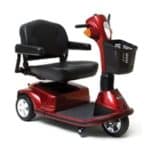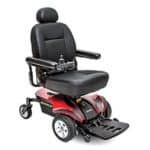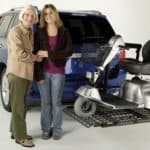Mobility solutions offer products that dramatically improve life for Americans with disabilities, including more access, increased safety, and overall mental well-being.
The Americans with Disabilities Act (ADA) prohibits discrimination against individuals with any condition or impairment, and it commands equal access to those with physical limitations. While this extends regulatory action toward businesses and public places, it doesn’t dictate what you should or shouldn’t have in your home. With so many mobility devices available, isn’t it time to make your sanctuary safer, convenient, and comfortable to live in?
Mobility solutions offer products that dramatically improve life for Americans with disabilities, including:
-
Access.
One of the biggest barriers facing those with mobility issues is access; getting from point ‘A’ to point ‘B’ can be a real struggle when you are living with physical limitations or impairment. stairlifts are endorsed by the American Association for Retired Persons (AARP) as a means of opening-up areas of the home for individuals with these challenges, that is both practical and viable. These lifts are professionally-installed by experts who take the time to ensure their patrons can use the devices with ease and confidence, which makes for a simple and seamless transition. Contemporary lifts are designed to meld with the surroundings, rather than stick-out aesthetically in the home.
-
Safety.
Around 235,000 people sustain injuries in the bathroom of their home, and approximately 14% of these incidents warrant hospitalization. For seniors, this statistic is even more serious as adults over the age of 85 are more likely to break one or more bones because of a bathroom fall. For this reason, it makes sense to beef-up bathroom safety – particularly if you are living with a physical disability. Lifts, shower-buddies, and toilet rails are some ways to increase safety in the bathroom- the most frequented room in most homes- and to create peace of mind for seniors, their families, and caregivers.
-
Health and well-being.
There is a strong correlation between having physical impairments or a disability and mental health and well-being; it is hypothesized that if an initial bout of depression is not treated, you are 50% more at risk for an recurrence. One of the contributing factors that can lead to chronic depression is a lack of socialization, which often results from a mobility issue or limitation. Treating depression in seniors typically requires diagnosis by a medical professional, though the signs of this debilitating condition are easy for caregivers to identify; some signs of depression include:
- Changes in mood.
- Lack of interest in things that were previously enjoyed.
- Changes in appetite or sleep pattern.
Depression can be treated with therapy, medications, and lifestyle changes. Consider making a change with mobility equipment and devices to foster socialization and independence, which can go a long way toward battling a depressed mood.
Some ways that you may be able to improve life quality today include:
-
Home assessment.
Assess your current needs and identify areas around your home that you have difficulty accessing; outline lifestyle changes that could make a difference in quality of life. Sometimes simple suggestions such as bath mats, grab-rails, shower seats, and walkers can make a significant difference, while for others, stair and vehicle lifts may be key. Consider scenarios that may call for assistance, such as showering or dressing, and target that with adaptive equipment and devices that will help overcome these hurdles.
-
Provider consultation.
Take time to talk with your provider about equipment that can help with access, safety, socialization, and autonomy. These practitioners may be able to issue prescriptions and recommendations that help get you the assistance and mobility devices that can make a difference in your life- or the life of someone you love. These medical providers may also be able to identify areas of need that can make a significant difference in overall quality of life.
-
Pacific Mobility.
Visit Pacific Mobility to see what mobility aids are available and that make the most sense for your living situation. Professional installation and personalized instruction can make adapting to this equipment simple and life-changing; don’t run the risk of injury by using re-purposed or used equipment bought from a third-party. Often times, safety guidelines change which can deem these devices unsafe if not purchased from an informed source, such as the mobility experts at Pacific Mobility.
Don’t let a physical impairment, disability, or mobility limitation impact your quality of life; consider how some innovative mobility aids can increase access, enhance safety, and facilitate social integration, which can lead to independence and overall well-being. If you or someone you love has a disability, adapt and adopt devices that will help overcome this hurdle and create a more satisfying living situation. Don’t let disabilities dictate where, when, and how you live your life- visit Pacific Mobility today!
President, Husband, Father, Grandfather Graduate of UC Davis- Bio Sci Major- Go Aggies! Jeff has extensive experience in all of Pacific Mobility’s products and services, and specializes in accessibility products as well as stairlifts, ceiling lifts and custom wheel chairs. His hobbies include spending time with family, gardening, mountain biking, exercising and off road motorcycle riding.
24 years as Owner/President of Pacific Mobility Center – selling, installing, and servicing stairlifts, porch lifts, ceiling lifts, pool lifts, handicap ramping, specialty wheelchairs, scooters, power wheel chairs, and other power mobility devices
Certified Environmental Access Consultant since 2008
Licensed General Contractor since 1998
Certified Aging in Place Specialist since 2016
Board Member for Home Access Professionals
Member of Association of Members of the Accessibility Equipment Industry (AEMA)









